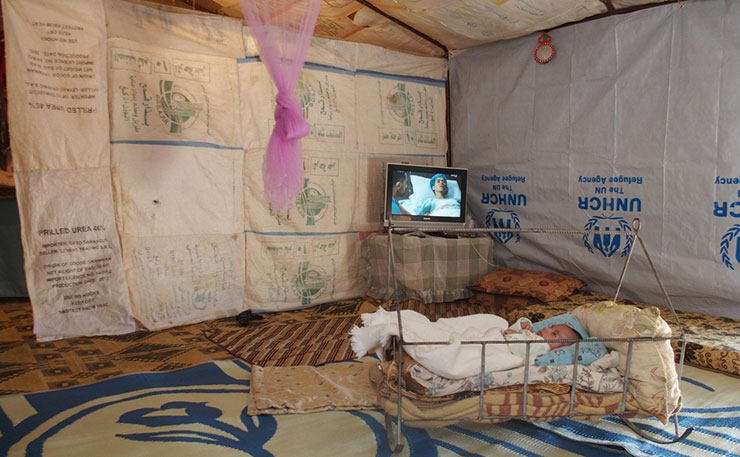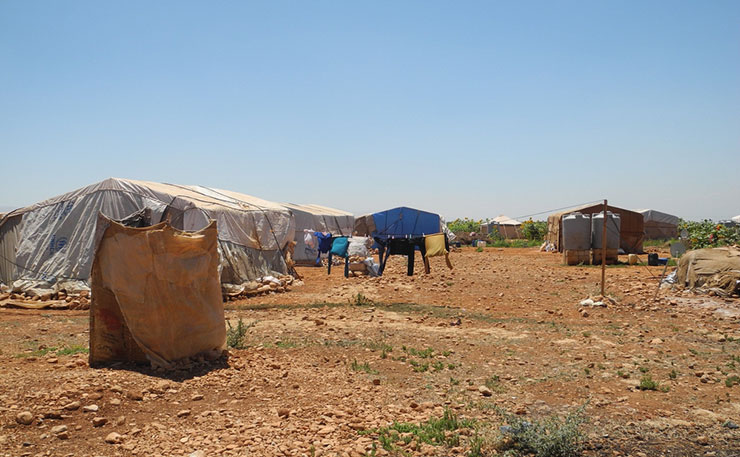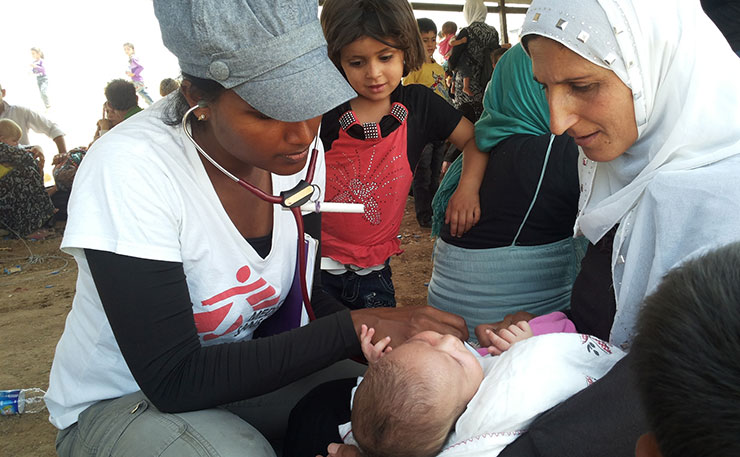Dr Chatu Yapa, a Canberra-based doctor, recently completed an assignment working with Syrian refugees in Lebanon, for Médecins sans Frontières. Her hope is that Australian politicians come to understand the crisis from a less privileged perspective.
There is an old saying that goes “You can’t really understand another person’s experience until you’ve walked a mile in their shoes”. I wonder what it must be like to walk in the shoes of a Syrian refugee in 2016. I came close to getting an answer to this question recently while working with Syrian refugees in the Bekaa Valley region of Lebanon in a Médecins sans Frontières (MSF) project.
I met a lady called Fatima*, a 65-year-old woman who had crossed the border between Lebanon and Syria with her two daughters. The family took two buses to travel from Aleppo to the capital, Damascus. They then walked 60 kilometres from Damascus, over the mountain range between Lebanon and Syria, to Majdal Anjar – a city in the Bekaa Valley. What they left behind in their home town of Aleppo was a city bombed on an almost daily basis, a home and farm left in ruins, loved ones dead or missing and after five years of war, a city that they could no longer call home. What met them in the Bekaa Valley was close to half a million fellow Syrians, all with similar tales.
The world glazes over stories like Fatima’s. She is another statistic in the ever-worsening crisis in Syria, a number that’s adding to the 4.8 million Syrians who have already fled their country. The majority of Syrian refugees I have met have not wanted to leave their home. They had a reasonably good life there before the civil war – they had access to the basics of life, good health care, family and friends and importantly, they lived with dignity.
Now, five years after the eruption of war, the death and destruction they have encountered on an almost daily basis has made it impossible for them to continue living in their home country.

When a handful of these people try to make better lives for themselves in mainland Europe, the message is clear: “you are not welcome here”. So where do they go? Naturally, they go to where they can access most easily – their neighbours’ door.
As of October 2016, the countries hosting the most Syrian refugees are Turkey with 2.5 million, Lebanon with approximately 1.2 million and Jordan with over 650,000. If you take this figure in terms of numbers of refugees per capita, it turns that out one in four people in Lebanon is a Syrian refugee, in Jordan it’s one in 10 and in Turkey one in 30.
If we compare this to countries such as Germany and Canada who have been more generous with their resettlement of refugees over the last couple of years, the ratio is one in 150 in Germany and one in 200 in Canada. And locally in Australia, one in 700 people are refugees – not including of course, the 3,331 held in detention at the end of September 2016.
These statistics are astounding. The media headlines talk about the burden of refugees in Europe and the ‘European migrant crisis’, yet the fact is that today, ten countries host 50 per cent of the world’s refugees. Some of these countries, such as Turkey, Lebanon, Iran and Pakistan also face significant domestic turmoil and political and economic instability.
As one of the most prosperous countries in the world, Australia could make a bigger difference to the current situation at multiple levels. The government could think of spending more Australian dollars on foreign aid. They could be a stronger diplomatic champion in helping to resolve the humanitarian and refugee crises. Or they could play their role as a global citizen and not push refugees offshore.

What we see today, however, are government policies that stray far from this ideal. The 2016/17 foreign aid budget was cut by over $200 million and Australia’s foreign aid as a share of national income is the lowest it has been since 2005.
While Australia had its term as a non-permanent member of the UN Security Council between 2013 and 2015, there was some success in negotiating access for humanitarian assistance to victims of the Syrian war. However, their influence was relatively limited compared to the bigger powers within the United Nations.
As for taking in refugees – well, we all know the beat of that drum in recent times. Deterrence policies such as mandatory detention, offshore processing, marketing campaigns explicitly telling refugees to stay away are among some of the ways in which Australia is responding.
Approximately 65 million people around the world are on the move right now – displaced in their own country or seeking refuge in another. The news headlines needs to turn away from ‘Europe’s migrant crisis’ and ‘Australia’s deterrent policies’ to one where world leaders acknowledge that millions of people throughout the world are escaping from intolerable conditions in their home country. Because in all of the political games and rhetoric, it is the everyday people like Fatima who suffer the most.
I wish that these leaders could walk a day in Fatima’s shoes.
* Name changed.
Donate To New Matilda
New Matilda is a small, independent media outlet. We survive through reader contributions, and never losing a lawsuit. If you got something from this article, giving something back helps us to continue speaking truth to power. Every little bit counts.






